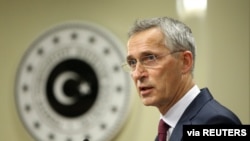NATO Secretary General Jens Stoltenberg said Friday a meeting of Western military alliance defense ministers had agreed to expand its training mission in Iraq to help Iraqi forces fight extremism.
"While the security situation remains challenging, NATO remains committed to stepping up our support," said Stoltenberg after a two-day defense ministers' meeting in Brussels.
"Our aim is to help build self-sustaining Iraqi forces able to fight terrorism, prevent the return of ISIS, and stabilize their country," added Stoltenberg, citing a "concerning" rise in the number and sophistication of attacks against international forces in Iraq.
NATO maintains a 500-strong training mission in the country to prepare local forces in the event of attacks from Islamic State extremists.
Stoltenberg said the scope of the mission's upgrading would be decided at a meeting of alliance defense ministers in February.
Anti-U.S. sentiment spiked anew in Iraq following the January killing of powerful Iranian military commander Major General Qassem Soleimani in a U.S. airstrike near Baghdad, leading to a suspension of NATO training of Iraqi forces.
The COVID-19 pandemic also forced the alliance to dial down numbers earlier this year, but the mission has since returned to full capacity, Stoltenberg said.
Afghanistan peace process
Turning to Afghanistan, Stoltenberg urged the Taliban to reduce "unacceptable levels of violence" and break ties with violent groups.
But he also betrayed concern over last week's U.S. announcement that the American troop contingent would be cut to around 2,500 early next year – despite the potential impact on peace negotiations between the Afghan government and Taliban insurgents.
Both sides' original understanding was that Washington would not fully withdraw prior to a solid deal between the two sides.
"The negotiations in Doha [Qatar] are fragile, but they are the best chance for peace in a generation. And all Afghans should seize this historic opportunity," Stoltenberg said, cautioning that "the next months are decisive for Afghanistan.
"NATO backs the peace process. And we have adjusted our presence to support it," scaling its troop presence back to less than 12,000 from more than 100,000.
"We decided to go into Afghanistan together; we will make decisions about future adjustments together; and we will leave together, when the time is right," Stoltenberg insisted.




